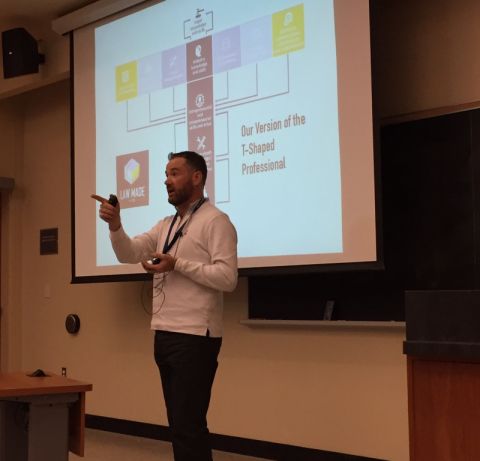
The power of predictive AI. Fundamental disconnects between legal leadership and modern technology. The coming tide of millennials. No stone was left unturned at the first Queen's Law conference on law, technology and the future: Lawyer 2.0.
The day-long event boasted an impressive array of guest speakers, including entrepreneurs, legal practitioners and academics. Conference co-organizers Chris Sullivan and Joshua Rim, both Law’20, were happy to see their ideas come to life, in a showcase of law and technology to the Queen’s Law community.
“The goal of Lawyer 2.0 was to broaden the horizons of law students in thinking more creatively about their future careers in light of the changes taking place in the legal services industry,” says Rim. “Our excellent slate of speakers shared their experiences and delivered insightful talks to our audience, so we think our conference was very successful in delivering unique value to law students,” adds Sullivan.
The event’s keynote speaker, Law Made Inc. co-founder Jason Moyse discussed the challenges associated with project management in a traditional law firm business model.
“Law firm leaders – the brain of the law firm – are enlightened,” admitted Moyse. “But they face a synaptic problem when it comes to managing projects. They can’t get the arms and legs coordinated to move."
Professor Shai Dubey, Law’94, Academic Director of the Graduate Diploma in Legal Services Management, spoke to the profound effect current students will have on legal practice’s future.
“In five years, there will be more millennials in legal practice than there ever were baby boomers,” proclaimed Dubey. “Current students will have a huge impact on what happens next in this industry.”
Professor Samuel Dahan also spoke at the event, to present on behalf of his Conflict Analytics Lab and showcase the wide-ranging impact of predictive software in future arbitration proceedings.
Patrick Maclean, Law’20, was inspired by the conference’s broad range of topics and guest speakers.
"Attending Lawyer 2.0 challenged me to think about the law outside of our traditional training,” says Maclean. “The breadth of perspectives created a confluence of the vision for future lawyers, and how we, as students, can contribute to the growth of the profession through the adoption of technology."
The event was organized in partnership with the Conflict Analytics Lab, Legal Hackers, the Queen’s Technology Law Club and the Queen’s Venture Law Society.
By Justin Murphy